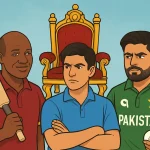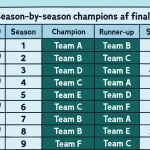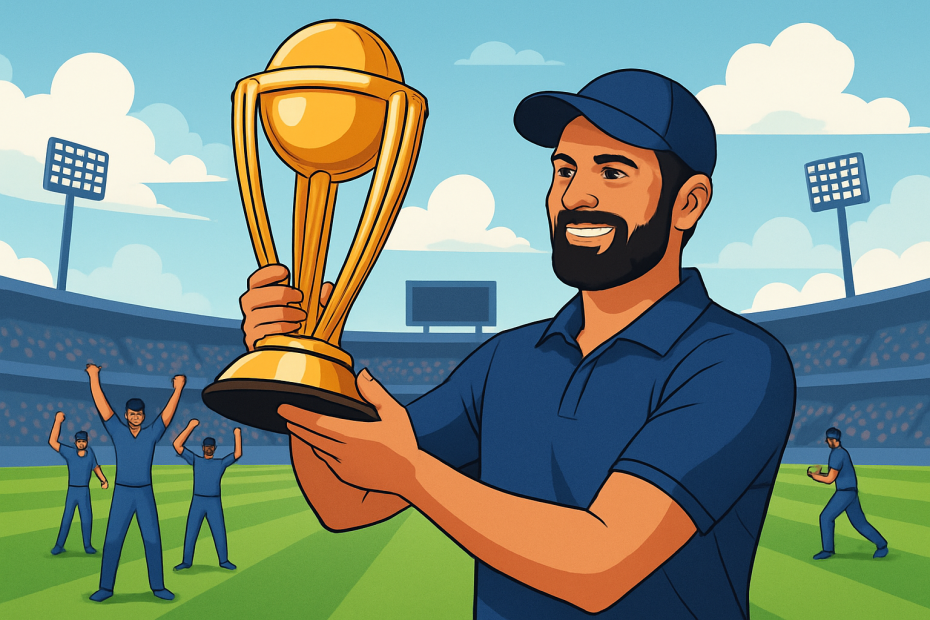At a glance
- Most successful captain in world cricket by total international wins: Ricky Ponting
- Most matches as captain across formats: MS Dhoni
- Most successful captain in Test cricket by wins: Graeme Smith
- Highest Test win percentage among long-tenure captains: Steve Waugh
- Most successful ODI captain by wins: Ricky Ponting
- Highest ODI win percentage among long-tenure captains: Clive Lloyd and Ricky Ponting lead the elite tier
- Most successful T20I captain by wins: Rohit Sharma
- Highest T20I win percentage with a meaningful sample: Asghar Afghan sits among the very best
- Captains with most World Cup titles: Ricky Ponting and Clive Lloyd
- Most ICC trophies won as captain: Ricky Ponting; MS Dhoni holds the limited-overs triple
- Most successful IPL captain: MS Dhoni by matches and wins, tied with Rohit Sharma on titles
Methodology and what success really means
Numbers tell a story, but captaincy lives in the space between scorecards: how a leader runs the dressing room, manages resources, senses a moment, and shapes a culture. For this resource, success is defined through layered metrics and context:
- Volume metrics: matches as captain, total wins, win percentage with meaningful match minimums.
- Hardware: World Cups, Champions Trophies, T20 World Cups, World Test Championship, Asia Cups, and top-tier franchise titles such as the IPL.
- Difficulty multipliers: away Test victories, knockout games, and performance against high-ranked opponents.
- Sustainability and era-shaping impact: how a captain’s method changed the way their team plays.
All stats and records referenced draw on ESPNcricinfo’s StatsGuru database and official ICC records. Win percentage leaders in each format are presented with sensible minimums to filter out small-sample outliers.
The big picture of captaincy success in world cricket
A captain’s reputation forms in strange places. On a hot afternoon, when the pitch looks flat and lifeless, a field change forces a mis-hit. In the last two overs, one bowler’s nerve is trusted over another’s speed. In the days before a tour begins, a training block is made harder than is comfortable. The winningest captain is rarely the loudest voice; often, it’s the one whose choices set a rhythm the team begins to own.
The greatest captain in cricket history is a debate with no single answer because the format, the era, and the kind of cricket matter. Test leadership is attritional; ODI captaincy is logistical; T20I captaincy is hyper-reactive. Toss in ICC trophies and the IPL, and the terrain shifts again. What follows is a structured, evidence-led view of who sits at the top, and why.
Leaders across formats — wins, matches, titles
Across all international formats, one name sits above the rest on pure wins: Ricky Ponting. The Australian great combined a colossal ODI record with sustained success in Tests and steady returns in T20Is. MS Dhoni, meanwhile, stands alone for sheer volume of captaincy duty across formats and for collecting every limited-overs ICC trophy on offer during his tenure. Graeme Smith’s Test footprint remains unmatched, and Rohit Sharma now sets the pace in T20Is.
Summary dashboard — across formats
- Most international wins as captain: Ricky Ponting
- Most international matches as captain: MS Dhoni
- Most ICC trophies as captain: Ricky Ponting; MS Dhoni the only captain to complete the ODI World Cup, T20 World Cup, and Champions Trophy treble
- Best multi-format win percentage among long-tenure captains: Ricky Ponting’s combined record sits in the top bracket, with Hansie Cronje and Clive Lloyd’s ODI-led profiles comparable on percentage albeit with fewer T20Is in their time
Most successful captain by format
Test cricket — the long-game summit
The most successful captain in Test cricket by total wins is Graeme Smith. He led from the front as an opener and oversaw victories across continents, absorbing pressure with a level of composure that belied his age when he first took the reins. His genius was structural: fast bowlers used as pairs, hard lengths on miserly lines, and batting orders that gave the seamers time to work. Home or away, Smith’s sides became a machine that choked games into their control.
In Test cricket, wins tell one story; away wins tell a harder one. Captains like Steve Waugh and Ricky Ponting built road-warrior teams that took the hardest prize in cricket — series wins outside home comfort. Virat Kohli’s India, with its relentless seam-bowling arsenal and fielding intensity, redefined the modern Asian touring side. Clive Lloyd crafted an aura backed by pace, pace, and more pace; attacking fields stayed attacking even when the pitch was quiet.
Test captaincy leaders and traits
- Graeme Smith: ironclad away record, relentless teams, superb time-management in the field.
- Steve Waugh: ice-cold decision-making, record win percentage among long stints, clinical away series triumphs.
- Ricky Ponting: ruthless ODI giant who kept the standard in Tests, sharp field plans at short midwicket and leg trap variants for subcontinental anchors.
- Virat Kohli: fast-bowling revolution in India, no easy singles policy, attacking declarations that stalked results.
- Clive Lloyd: blueprint of intimidation through four-pronged pace, sustained dominance through cycles.
Test benchmarks table (long-tenure focus)
| Name | Key claim | Notable markers |
|---|---|---|
| Graeme Smith | Captain with most Test wins | Unmatched volume of wins; longevity and away success |
| Steve Waugh | Highest win percentage among long-tenure Test captains | Elite away record; aggressive declarations |
| Ricky Ponting | All-format colossus with high Test success | Home-and-away series wins; keen match-up captain |
| Virat Kohli | Most Test wins by an India captain | Fast-bowling depth; consistent series streaks |
| Clive Lloyd | Dynasty-level control | Pace quartet era; psychological supremacy |
Why Waugh’s percentage matters
Win percentage in Tests can be distorted by draws, but in the Waugh era those draws shrank, and Australia went hunting. His sides never allowed a game to idle. Tailenders were suffocated by catchers in front of square and a spinner trusted to attack. Waugh’s best work often came before the toss — selection profiles chosen to win, not to avoid losing.
ODIs — scheduling, surges, and the knockout layer
Ricky Ponting’s ODI captaincy is the high bar for wins. Beyond volume, he presided over stretches where Australia felt inevitable. The method was built on a few recurring patterns: a powerplay surge to get ahead of the rate, a middle-overs squeeze with fielders saving one, and late bursts by finishers who could hit straight and hard. In knockouts, his teams rarely blinked.
MS Dhoni’s ODI legacy is different in texture. He curated chases with a surgeon’s patience, especially on two-paced pitches. His reading of tempo was uncanny; late charges were timed around matchups rather than overs. Bowlers were rotated in pockets that prioritized match-up advantage over simplistic new-ball/old-ball splits. He also managed transition generations without panic.
Clive Lloyd and Allan Border belong to the foundation layer of limited-overs captaincy — blueprint builders. Lloyd embraced pace in ODIs with the same courage as in Tests, while Border created game plans that asked for no-frills consistency and fielding excellence. Eoin Morgan, meanwhile, reinvented a batting template: more boundary hitters, more depth, more permission to fail in pursuit of a higher ceiling.
ODI captaincy leaders and traits
- Ricky Ponting: most ODI wins; elite knockout threat; ruthless powerplay intent.
- MS Dhoni: ODI chaser supreme; finishing masterclass; selected for roles over reputations.
- Clive Lloyd: ODI dynasty dealer; win percentage at the elite end with a strong core.
- Allan Border: culture builder; fitness and fielding as non-negotiables; pragmatic tactics.
- Eoin Morgan: white-ball modernist; embraced data-led matchups; rebalanced risk.
ODI benchmarks table
| Name | Key claim | Notable markers |
|---|---|---|
| Ricky Ponting | Captain with most ODI wins | High win% over large sample; multiple ICC trophies |
| MS Dhoni | India’s winningest ODI captain | Unique calm in chases; limited-overs treble |
| Clive Lloyd | Elite win percentage with a dynasty core | Trophy-laden era; aggressive field settings |
| Allan Border | High-volume wins with a transformation brief | Fielding standards; structural stability |
| Eoin Morgan | Modern batting template creator | Boundary-first philosophy; match-up intelligence |
T20Is — the sprint with strategy
T20I captaincy rewards a different gear. There is barely time for a second plan, let alone a third. Bowling changes are micro-investments; every over carries swing value on the win probability curve. Rohit Sharma’s T20I captaincy sits at the top in wins, built on attacking fields in the powerplay and a knack for slipping in a favourable over when the batter’s eye thinks otherwise. He treats the sixth over like a transition window, often freeing an over of wrist-spin against the wind if the match-up is right.
Babar Azam’s method is structure-first. He stabilizes the top, trusts his quicks, and likes a left-arm angle in the powerplay. Eoin Morgan shortened the boundary between instinct and data more than most, stacking his middle order with hitters who could survive using boundary frequency rather than dot-ball paranoia. MS Dhoni’s T20I tenure predated many of the format’s tactical revolutions, yet he captured the earliest world title by trusting specialists and owning chaos.
T20I benchmarks table
| Name | Key claim | Notable markers |
|---|---|---|
| Rohit Sharma | Captain with most T20I wins | Powerplay aggression; bowling changes that hunt wickets |
| Babar Azam | High-volume wins; structural stability | Pace-led plans; anchoring style within resource constraints |
| Eoin Morgan | Philosophy leader in T20 tactics | Match-up obsession; batting depth; fielding intensity |
| MS Dhoni | Early T20I trophy collector | Specialist roles; death-overs clarity |
| Asghar Afghan | Among best T20I win percentages at scale | Cohesive group; clarity of roles |
ICC tournaments and trophies — the currency of immortality
Knockout cricket is a different sport. Overs feel heavier, decisions louder. Pressure amplifies simple mistakes, then lingers. Captains who collect ICC trophies survive the toughest hours with clarity.
- Most ICC trophies as captain: Ricky Ponting leads the field, combining multiple ODI World Cups with multiple Champions Trophies.
- Limited-overs triple: MS Dhoni remains the only captain to lift the ODI World Cup, T20 World Cup, and Champions Trophy, completing the full set of white-ball majors.
- World Cup dominance: Ricky Ponting and Clive Lloyd share the landmark of two ODI World Cup titles as captains. Sustained runs through group stages, semifinals, and finals require more than talent; they require a captain’s ability to keep a team’s emotional temperature steady.
Pat Cummins has stitched together a modern multi-trophy resume with command in both red and white ball. Rohit Sharma has reestablished India’s global white-ball finishing power with an ICC title and a method that travels.
Asia Cup, while not an ICC event, carries regional pressure distinct from global tournaments. MS Dhoni and Rohit Sharma both have multiple titles as captains in the competition, underlining the ability to control group-to-final pathways against familiar rivals who know your patterns too well. That kind of success speaks to repeatability — not just brilliance.
Franchise lens — IPL and beyond
The IPL is ruthless and noisy. Teams carry deep analytics, and match-ups are debated down to whether a new ball grips on an abrasive square. The most successful IPL captain conversation bends towards MS Dhoni because he owns the records for most matches and most wins as captain, and because of what he did with late-overs bowling units built on role players who might not have led headlines elsewhere. By titles, he shares the peak with Rohit Sharma. Rohit’s Mumbai sides mirrored national-team principles: a pace battery with airspeed and change-ups, high-floor batting depth, and fielding standards that squeezed singles even on the biggest grounds.
IPL captaincy benchmarks table
| Name | Key claim | Notable markers |
|---|---|---|
| MS Dhoni | Most matches and most wins as captain; joint-most titles | Finisher’s poise; bowlers used in micro-roles; unflappable under pressure |
| Rohit Sharma | Joint-most titles; sustained win rate | Powerplay routines; death-overs bowling depth; young-core integration |
| Gautam Gambhir | Multiple titles; fearless match-ups | Spin chokeholds at home; left-right batting toggles |
| Hardik Pandya | Standout early win% at smaller sample | Impact-player management; flexible batting order |
Other leagues point to the same truth: the captain’s job is environment creation. In the PSL, Shaheen Afridi’s back-to-back triumphs showcased aggressive new-ball plans and a locker room that bonded around that intent. In the BBL, Perth’s leadership group has consistently recycled fast-bowling depth and fielding excellence while balancing domestic schedules and player availability. The names can rotate; the standards do not.
Country-by-country snapshot
India — trophies, transformation, and temperament
- Most successful Indian captain overall: MS Dhoni. No one else pairs the volume of wins with the complete set of white-ball ICC trophies and an IPL legacy. He reimagined selection for roles, empowered spinners to attack in middle overs, and normalized calm chases.
- Most successful Indian Test captain: Virat Kohli by wins. His stamp is the fast-bowling renaissance: quicks rotated as a cartel, relentless short-ball plans away, and slip cordons that refused to leak.
- Most successful Indian ODI captain by wins: MS Dhoni. His ODI method — elongate the game, keep totals chaseable, finish late — became a playbook for a generation.
- Most successful Indian T20I captain by wins: Rohit Sharma. Aggression early, impact players trusted, and bowlers used in one-over spurts to win powerplay battles.
Australia — relentless standards
- Greatest captain in Australia’s ledger by wins and trophies: Ricky Ponting. He stands as the winningest ODI captain and an all-format titan.
- Steve Waugh’s Test win percentage and away record still set the standard for attritional excellence.
- Allan Border’s tenure reset Australia’s cricket culture, turning potential into a conveyor belt of discipline.
England — reinvention as a competitive advantage
- Eoin Morgan’s white-ball revolution recoded the way England thinks about ODIs and T20Is: pick hitters, bat deep, accept collateral damage for a higher boundary rate, and field as if every run is a currency.
- In Tests, Michael Vaughan’s strategic clarity and Joe Root’s volume of wins both command respect. Root navigated packed itineraries while carrying the batting burden, a notoriously hard trick for a Test skipper.
Pakistan — aura, pragmatism, and modern structure
- Imran Khan remains a cultural north star for leadership under pressure, coaxing belief out of a group that thrived on rhythm bowling and mercurial batting.
- Misbah-ul-Haq stabilized Pakistan’s Test cricket with calm tactics and understated away grit, emerging as the most successful Pakistan Test captain by wins.
- Babar Azam leads T20I wins charts for Pakistan and has shaped a method around disciplined new-ball spells and anchors who can accelerate cleanly.
South Africa — the Smith blueprint
- Graeme Smith is the definitive South African captain, and the most successful Test captain globally by wins. His sides traveled hard and closed out tight sessions with disciplined seam plans.
- Hansie Cronje’s ODI returns by win percentage sit at the top bracket in the format’s history, though the context of his career is complex.
Sri Lanka — tactical guile and composure
- Arjuna Ranatunga restored Sri Lanka’s cricket identity with openers who could break fields early, spinners who attacked during consolidation, and a captain’s presence that convinced teams they belonged in the biggest moments.
- Mahela Jayawardene offered a cerebral template in all formats; field placements under him often felt one ball ahead.
West Indies — captains of an era
- Clive Lloyd’s teams were inevitable. Four fast bowlers and no compromises. The psychological pressure his side exerted was as valuable as any outswinger.
- Vivian Richards carried that confidence in limited-overs cricket, with ODI win percentage figures that still live among the elite for a captain with a serviceable sample.
New Zealand — smart margins
- Stephen Fleming remains a captain’s captain; peers and coaches cite him as one of the sharpest field-setting minds of his time, with ODI wins stacked over a long runway.
- Kane Williamson married serenity with precision, delivering across formats and in ICC tournaments with a tactical calm beyond his years.
Bangladesh — belief becomes habit
- Mashrafe Mortaza is the most successful Bangladesh ODI captain by wins, blending heart, seam control, and the permission for batting line-ups to build totals without panic.
Afghanistan — clarity of roles
- Asghar Afghan’s T20I win percentage landed him in rare company, built on spinners who could bowl in every phase and batters who understood their scoring zones.
Who is the most successful captain in cricket history — the multi-metric answer
- Ricky Ponting ranks as the most successful captain in world cricket when total wins and ICC trophies are combined. His ODI record is unmatched by volume, his Test record stands in the highest bracket, and he owns a cabinet stuffed with world titles.
- MS Dhoni is the best cricket captain of all time if you weight the white-ball treble, pressure control in chases, and leadership longevity across formats and the IPL. No one else has so completely mastered the various currencies of limited-overs cricket while simultaneously managing transition phases without a slide.
- Graeme Smith is the most successful captain in Test cricket by wins, and sits at the apex for away durability and series control.
- Steve Waugh owns the summit for Test win percentage with a sustained tenure, and did it by attacking the draw out of the game.
Comparisons that define the debate
MS Dhoni vs Ricky Ponting captaincy record
- Wins and trophies: Ponting leads the aggregate wins column and tops the ICC trophy count. Dhoni counters with the only limited-overs treble and the most matches captained across formats.
- Style: Ponting built scoreboard pressure and loved hunting wickets with attacking midwickets and ring fields that dared singles into miscues. Dhoni built timing pressure — joyless singles in the deep, and then a calculated burst at the death.
- Knockouts: Both led cold, efficient knockout runs. Ponting’s sides often smothered semifinals before the break; Dhoni’s units were engineered to win the last ten overs.
- Legacy: Ponting redefined ruthless; Dhoni normalized serenity.
Rohit Sharma vs MS Dhoni in IPL captaincy
- Titles: Tied at the top.
- Matches and wins: Dhoni leads comfortably, reflecting longevity and sustained competitiveness.
- Strategy: Rohit’s template is resource amplification — maximize the first six overs with ball and bat, then trust specialists. Dhoni’s is role fidelity — a finisher hits straight, a hit-the-deck quick owns a hard length, a finger spinner works the big boundary.
- Culture: Rohit harmonized a star roster without ego leaks. Dhoni created a sanctuary for role players to become match-winners.
Virat Kohli vs MS Dhoni as India captains
- Tests: Kohli’s record by wins is the best for India. His home fortress was built on relentless seam and spin attack with catching excellence. Away, he pushed for results rather than safety.
- ODIs and T20Is: Dhoni leads by matches, wins, and trophies, and is the finisher archetype whose chases became lore.
- Dressing room impact: Kohli defined intensity and set fitness markers that transformed India’s fielding and fast-bowling clip. Dhoni managed egos with quiet authority and gave roles the oxygen to thrive.
Babar Azam vs Rohit Sharma in T20I captaincy
- Wins: Rohit leads the T20I wins column overall; Babar leads Pakistan’s ledger with a high tally.
- Philosophy: Babar leans into structure and ball dominance early; Rohit prioritizes taking the new ball phase away from the opposition with attacking fields and proactive bowling changes.
- Batting lens: Babar stabilizes and accelerates; Rohit dictates and disrupts.
Graeme Smith vs Ricky Ponting in Tests
- Volume vs percentage: Smith owns more wins; Ponting’s win percentage sits in the elite bracket.
- Away steel: Smith’s resume is forged on the road; Ponting’s Australia traveled hard and often came back with the urn and beyond.
- Tactical identity: Smith’s patience with seamers as partnerships is a masterclass; Ponting’s fields often manufactured dismissals by baiting the clip to a catcher.
Records and specialized angles
Captains with most wins across formats
- Ricky Ponting sits at the top of the all-format wins list, reflecting an era where Australia almost industrialized victory.
- MS Dhoni follows, buoyed by a huge ODI tally and the rise of T20I leadership.
- Graeme Smith lives high on the list thanks to his Test mountain and a strong ODI footprint.
Most matches as captain in cricket
- MS Dhoni captained more international matches than any other player, an endurance feat as much as a tactical one.
- Ricky Ponting and Graeme Smith sit next, exemplifying sustained trust over long cycles.
Most successful captain by win percentage with match minimums
- Test (minimum 20 Tests): Steve Waugh stands as the high-water mark, with several others — from Mike Brearley to Virat Kohli — forming the next ring depending on thresholds.
- ODI (minimum 50 ODIs): Clive Lloyd and Ricky Ponting headline with very high percentages sustained over many matches.
- T20I (minimum 30 T20Is): Asghar Afghan’s win percentage among captains with a real sample is exceptional; Rohit Sharma and Babar Azam offer large-sample success in the modern era.
Captaincy records home vs away
- Test away wins separate good from great. Graeme Smith and Steve Waugh own the away axis; Kohli advanced India’s touring competitiveness; Ponting’s Australia proved repeatable under pressure across surfaces.
- In limited-overs, away series and neutral ICC venues complicate the home-away split. Captains who sustain win percentages outside their comfort zones — Ponting, Dhoni, Morgan — tend to dominate knockout brackets.
Leadership in knockout matches
- Ponting’s sides often throttled knockouts early.
- Dhoni’s units absorbed pressure and exploited the death overs.
- Williamson’s teams, even when underpowered, often arrived in finals by doing the little things without fuss.
- Cummins applied red-ball clarity to white-ball finals — optimal lengths, no freebies, choke holds.
Left-handed vs right-handed captains
- Left-handed captains with standout records: Graeme Smith, Clive Lloyd, Allan Border, Sourav Ganguly in India’s transformation phase.
- Right-handed giants: Ricky Ponting, MS Dhoni, Virat Kohli, Eoin Morgan, Imran Khan.
Youngest and most seasoned tournament winners
- Graeme Smith began early and sustained for an era. Experience can be acquired in two ways; Smith did it at accelerated speed, setting new norms for early responsibility.
- Late-career captains like MS Dhoni built legacies on maturity and cold-blooded decision-making in the tensest overs.
Most successful captain in World Cup cricket
- ODI World Cup: Ricky Ponting and Clive Lloyd lead with two titles each as captain.
- T20 World Cup: Titles distributed among captains with fewer repeat winners; MS Dhoni and Rohit Sharma stand out for India’s white-ball lineage; Aaron Finch and Jos Buttler claim their place in the modern ledger.
- Champions Trophy: Ricky Ponting lifted it multiple times as captain; MS Dhoni owns one as part of his treble.
The intangibles that change matches
- Field placement as a pressure tax: Dhoni often placed a short midwicket for the pick-up flick, inviting a miscue into a ring fielder. Ponting’s leg-side catchers turned singles into gambles. Fleming’s 45-degree fields stole boundaries by angle, not numbers.
- Bowling as partnerships: Smith and Waugh often paired seamers for complementary angles; one hit the splice, one chased the outside edge. Kohli’s India used a three-seamer policy to trap teams into false comfort before lunch and after tea.
- Batting tempo control: Morgan permitted dot-ball clusters in exchange for boundary frequency, reconstructing risk. Dhoni extended chases into a zone where the bowler’s margin for error vanished.
- Culture as a competitive edge: Border forced fitness into the DNA. Lloyd demanded fearlessness backed by craft. Misbah normalized calm. Rohit opened the door for young players to own the ball in critical overs without pecking-order anxiety.
Home vs away — the captain’s audit
- Test captains who win overseas carry a different glow. Waugh’s Australia ended streaks in places where visiting sides had gone to die. Smith’s teams built a reputation for squeezing life out of flat decks away from home. Kohli’s India embraced fast-bowling violence as a road strategy.
- In white-ball away contexts, neutral venue tournaments behave like exams. Ponting’s sides turned unfamiliar pitches into carbon copies of home advantage by taking the same tactical choices with ruthless discipline. Dhoni’s teams learned to win without romance — the unglamorous one-for-30 spells and the ugly 40 off 55 balls in a tricky chase.
Most successful captain by country — quick capsule list
- India: MS Dhoni overall; Virat Kohli in Tests; Rohit Sharma in T20Is.
- Australia: Ricky Ponting across formats; Steve Waugh in Tests by win percentage.
- England: Eoin Morgan in white-ball cricket; Michael Vaughan and Joe Root in Tests by style and volume respectively.
- Pakistan: Imran Khan as leadership icon; Misbah-ul-Haq in Test wins; Babar Azam in T20I wins.
- South Africa: Graeme Smith across formats with Test dominance.
- Sri Lanka: Arjuna Ranatunga as foundational limited-overs leader; Mahela Jayawardene for tactical purity.
- West Indies: Clive Lloyd across formats of his time; Vivian Richards for ODI leadership craft.
- New Zealand: Stephen Fleming for captaincy IQ; Kane Williamson for modern multi-format control.
- Bangladesh: Mashrafe Mortaza for ODI leadership scale.
- Afghanistan: Asghar Afghan for T20I win percentage and role clarity.
Captains with the most World Cup titles and ICC trophies
- Ricky Ponting: multiple ODI World Cups and multiple Champions Trophies.
- Clive Lloyd: two ODI World Cups.
- MS Dhoni: ODI World Cup, T20 World Cup, Champions Trophy; unmatched white-ball set.
- Modern leaders like Pat Cummins and Rohit Sharma have added major ICC trophies and reshaped the current landscape.
What the leaderboards miss — selection courage and man-management
- Selection courage: Great captains pick for roles, not reputations. Dhoni built entire seasons on bowlers who were ignored elsewhere because they did one thing extraordinarily well. Morgan picked hitters who might fail twice to win thrice. Waugh backed a leg spinner in moments when run-rate fear would have benched him.
- Man-management: Smith’s teams looked the same on day one and day five. Border’s sides never took fielding off. Rohit’s squads empower debutants to own a phase without fearing seniors. Imran created belief with clarity — bowlers knew their fields would match their strengths.
A compact table of crown claims
| Metric | Leader(s) |
|---|---|
| Most international wins as captain | Ricky Ponting |
| Most international matches as captain | MS Dhoni |
| Most Test wins | Graeme Smith |
| Highest Test win% at long tenure | Steve Waugh |
| Most ODI wins | Ricky Ponting |
| Elite ODI win% (long tenure) | Clive Lloyd, Ricky Ponting |
| Most T20I wins | Rohit Sharma |
| Elite T20I win% (meaningful sample) | Asghar Afghan among leaders |
| Most ICC trophies as captain | Ricky Ponting; MS Dhoni owns the white-ball treble |
| Most IPL titles as captain | MS Dhoni and Rohit Sharma |
| Most IPL wins as captain | MS Dhoni |
How an expert weighs the ultimate crown
- Trophies matter: ICC titles are a captaincy currency.
- Tests matter: they build legacy brick by brick; away wins double the credit.
- Consistency matters: sustained win percentage against strong opposition is the best antidote to easy narrative.
- Culture matters most: the best captains leave a team that keeps winning after they are gone.
Final verdict
- Most successful captain in cricket if the measure is wins plus global silverware: Ricky Ponting. He marshalled an era with crushing consistency, topped ODI wins, stayed elite in Tests, and lifted more ICC trophies than any other captain.
- Greatest captain in cricket history if the measure emphasizes multi-format mastery, pressure handling, longevity, and the limited-overs triple: MS Dhoni. He transformed how India finished games, professionalized role-based selections, and lifted every major white-ball trophy while owning the IPL’s leadership records.
- Most successful captain in Test cricket: Graeme Smith by wins; Steve Waugh by long-tenure win percentage.
- Most successful ODI captain: Ricky Ponting by wins and top-tier win percentage; Clive Lloyd in the elite percentage club across a dynasty run.
- Most successful T20I captain: Rohit Sharma by wins; Asghar Afghan among the best by win percentage with a meaningful sample.
- Most successful IPL captain: MS Dhoni by matches and wins, tied with Rohit Sharma on titles.
The truth, whispered from dressing rooms to selection meetings, is simple. Captaincy is a craft of edges. The greatest skippers in world cricket are those who found edges everywhere — in fielding angles, bowling pairings, mindset habits, and selection courage — and kept sharpening them until winning felt ordinary. That is how you become the most successful captain. That is how a team becomes a standard.
Data sources and note
- Primary data references: ESPNcricinfo StatsGuru and ICC records.
- This hub synthesizes wins, win percentages, trophies, and context, with minimum thresholds applied for fairness in percentage comparisons.
- Figures reflect records through the last completed international series and franchise season cycles and will be refreshed regularly.
Related posts:
Cricket Prince: Who's the Heir — Lara, Gill, or Babar?
T20 Highest Score Guide: Team Totals, Records & Context
Youngest cricketer in India: Complete Guide to Records & Pathways
Psl winners list: Season‑by‑season champions & finals
About vignesh puthur - Official bio, work & contact
How Many Countries Play Cricket? 108 ICC Members (Updated Oct)
Angad Mehra

- Angad Mehra is an avid cricket analyst and sports writer who pays attention to betting patterns and match specifics. Angad has years of experience writing, covering both Indian and international cricket. He explains stats, odds, and strategies in a clear, simple manner that resonates with fans. Readers trust Angad’s articles to keep them ahead of the game whether on or off the field. Off the field, you can find him either tracking live scores ball by ball or debating IPL lineup changes.
Latest entries
 GeneralNovember 1, 2025Cricket Prince: Who’s the Heir — Lara, Gill, or Babar?
GeneralNovember 1, 2025Cricket Prince: Who’s the Heir — Lara, Gill, or Babar? GeneralOctober 31, 2025T20 Highest Score Guide: Team Totals, Records & Context
GeneralOctober 31, 2025T20 Highest Score Guide: Team Totals, Records & Context GeneralOctober 29, 2025Youngest cricketer in India: Complete Guide to Records & Pathways
GeneralOctober 29, 2025Youngest cricketer in India: Complete Guide to Records & Pathways GeneralOctober 27, 2025Psl winners list: Season‑by‑season champions & finals
GeneralOctober 27, 2025Psl winners list: Season‑by‑season champions & finals
